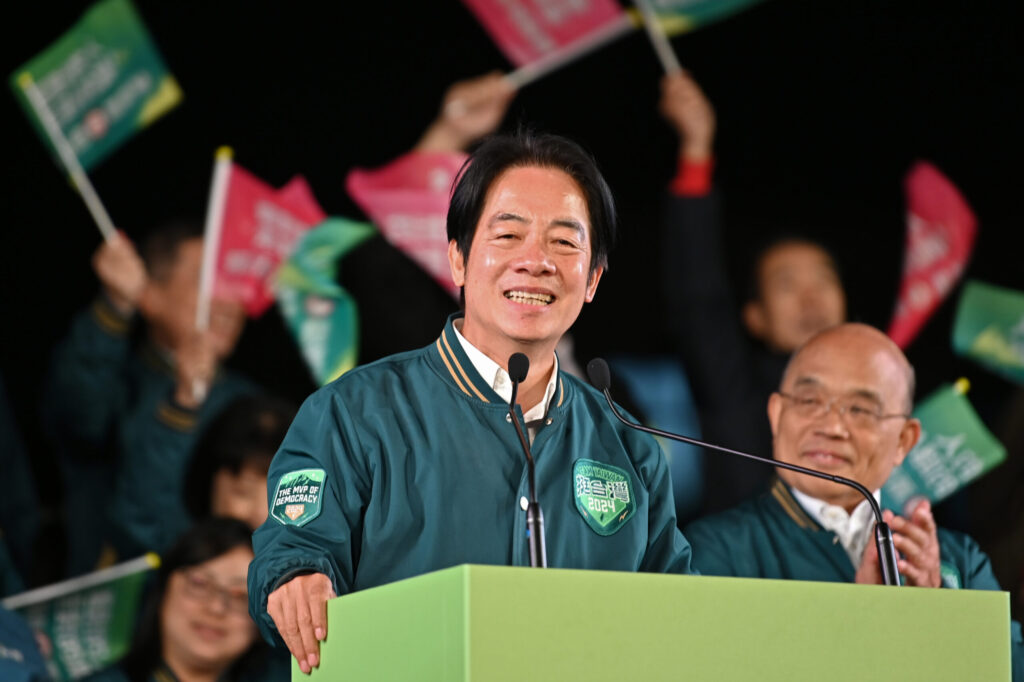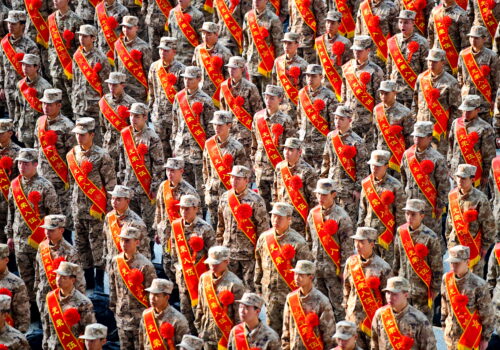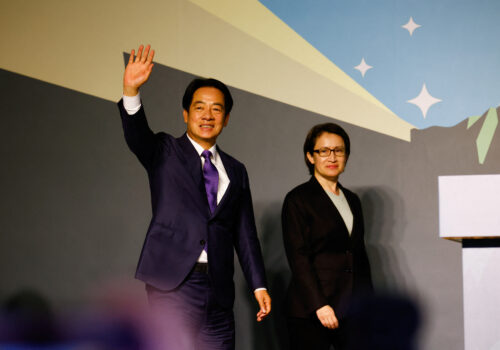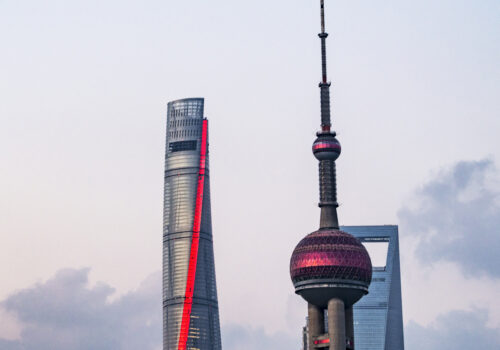On May 20, Taiwan will swear in its next president, Lai Ching-te, also known as William Lai. This victory for Lai, a member of the Democratic Progressive Party (DPP), marks the first time in Taiwan’s democratic era that a political party has won three straight presidential elections in a row.
Lai brings with him several priorities and proclivities—first and foremost a reputation as a “pragmatic worker for Taiwan independence”—that on the surface seem to be a liability for easing cross-strait tensions. If wielded appropriately, however, this label could be an asset.
Who is William Lai?
Lai’s political rise benefits from his all-Taiwanese rags-to-riches life story. A coal miner’s son raised by a single mother, Lai beat the odds on his ascent to the highest public office in Taiwan. He started his career as a doctor. Then, at age thirty-seven, he turned to politics. He served in Taiwan’s legislature, then as a two-term mayor of Tainan, the DPP’s political heartland. He subsequently rose in the party’s ranks to become Taiwan’s premier and then its vice president, both under President Tsai Ing-wen.
On China policy, Lai has carried a target on his back since the very first month of his premiership. In September 2017, Lai answered a legislator’s question about his view on Taiwan’s independence by saying he saw himself as a “pragmatic worker for Taiwan independence.”
That effectively became his bumper sticker, while the important details in the rest of his answer were quickly forgotten. But it is these details that paint a more complete picture of his position on the issue. For example, Lai also said in his answer that he believes that the Taiwan government’s name is the Republic of China and that Taiwan was already independent—and, therefore, the DPP government had no need to declare Taiwan’s independence.
Lai’s statement had several important nuances: The first part aimed to reassure Beijing by saying Taiwan is keeping “China” in its official name. The second part asserts Taiwan already has (de facto) independence. The third part of this answer makes a politically expedient logical jump, saying that there is therefore no need to declare or pursue de jure independence. That line is designed to provide an off-ramp to all parties, including both the DPP’s Taiwanese nationalist electorate and Beijing.
Had these other statements received airtime instead of his new bumper sticker, Lai’s cross-strait policy would have come across as rather mainstream for the DPP. After all, his statement was in line with the main thrust of the DPP’s principal guidance on cross-strait policy, the 1999 Resolution on Taiwan’s Future. Instead, however, Lai’s position has come across as firebrand fringe, according to the image suggested by his bumper sticker, and Beijing has joined in painting him as such.
Baggage or political cover for Lai’s dealing with Beijing?
That “pragmatic worker for Taiwan independence” label creates a liability for Lai, but it could also be an asset. It’s a liability in that Beijing uses it to justify calling Lai a radical troublemaker, meaning that Beijing will be more likely to characterize Lai’s moves as envelope-pushing in pursuit of de jure independence. Beijing is likely to give Lai even less benefit of the doubt than his predecessors. Thus, Beijing may use more sticks than carrots in its approach toward the Lai administration.
However, the “pragmatic worker for Taiwan independence” moniker has also helped Lai further appeal to the DPP’s nationalist wing, made up of Taiwan’s version of Beijing skeptics. It’s similar to how some have argued that “only Nixon could go to China” in the 1970s, meaning that then US President Richard Nixon had a sufficiently anticommunist reputation to give him the political room for maneuver to open the door to US relations with China without facing domestic backlash. In Lai’s case, being a favorite of the nationalist wing could earns him a higher level of baseline trust from Taiwan’s least Beijing-friendly constituency. That, in turn, could enable Lai to extend an olive branch toward Beijing at a relatively lower political cost than it would have been for virtually any other first-tier DPP politician.
It follows that, if Beijing and Taiwan were ever to negotiate some form of stabilizing cross-strait deal, it may be easier for Lai to push for its approval by Taiwan’s legislature because the most hawkish constituency—those who are normally most likely to veto any cross-strait deal—trust the incoming president. As I previously wrote, political trust matters in cross-strait negotiations. The same act of deal-making by other Taiwanese political leaders might have been framed as stepping stones toward eventual capitulation by Beijing skeptics; but, if Lai pushes for it, they may be more likely to believe he is exerting far-sighted statecraft and playing a long game.
The near-term outlook for cross-strait engagement under Lai
Sufficient domestic backing is important for any cross-strait negotiations. Judging from his July 2023 opinion piece in the Wall Street Journal, Lai is interested in pursuing cross-strait dialogue, just not on the basis of political preconditions unilaterally set by Beijing. However, it seems unlikely that Beijing will engage with him any time soon.
In recent years, the DPP has established itself as an effective manager of Taiwan-US relations, while Taiwan’s opposition parties enjoy a virtual monopoly over ties with Beijing. Thus, the electoral windfall for the DPP could be significant if the party, under Lai’s leadership, develops positive relations with both the United States and China, thereby occupying both ends of the spectrum of US-China relations in Taiwanese politics. Such a move could potentially leave other political forces in Taiwan in the dust.
This is why Beijing will be in no rush to genuinely pursue talks with Taiwan. Beijing will likely demand that Lai first make a dramatic show of goodwill involving costly major commitments before Beijing will entertain talking with him—commitments that Beijing knows Lai can ill afford to make. These commitments could include asking Lai to endorse the 1992 Consensus, under which Taiwan will pledge itself to be part of One China, a stipulation that is consistently opposed by a solid majority of Taiwanese, sometimes by as much as 85 percent of the population.
Therefore, Beijing seems more likely to continue a sticks-heavy approach toward the Lai administration. Expect to see this combination of tactics:
- Continued rhetorical censure from Beijing’s Taiwan Affairs Office.
- Amped up efforts to spread disinformation or influence campaigns across Taiwan.
- Targeted economic sanctions or other coercive actions against Taiwanese exports, which will continue and may take the form of “indefinite suspensions” rather than permanent bans.
- Gray zone security operations that border on military brinkmanship against Taiwan, which may only accelerate in frequency. This comes as Beijing is showing signs of conducting a gradual transition from using primarily military and paramilitary actors toward using a more hybrid combination of both military and (civilian-adjacent) law enforcement, especially in waters near Taiwan’s Kinmen and Matsu islands.
If this turns out to be the case, then Beijing will have passed on a major opportunity for a durable cross-strait thaw. As a result, the world may be looking at another four bumpy years ahead for the Taiwan Strait and beyond.
Given the challenges, the Lai administration should consider combining capability-building and reassurance. Taipei can deepen international relationships and support to enable Taiwan to engage Beijing from a position of confidence. Concurrently, Taipei needs to consistently reassure Beijing that Taipei’s door is open. Taipei must signal that it has no plans to pursue anything drastic and that there is ample time to work out cross-strait differences peacefully. In other words, Beijing can afford to be patient. Moreover, Taipei should seek to convey its willingness to ease tension through dialogue and to build on commonalities where they exist, with the proviso that dialogue needs to take place on the basis of equality and mutual respect between the two sides. Any cross-strait dialogue taking place on preconditions unilaterally set by Beijing will be politically unviable in Taiwanese politics.
Wen-Ti Sung is a nonresident fellow with the Atlantic Council’s Global China Hub. He is a sessional lecturer in the Australian National University’s College of Asia and the Pacific, and a member of the Australian Centre on China in the World.
Further reading
Tue, Mar 19, 2024
There will be no ‘short, sharp’ war. A fight between the US and China would likely go on for years.
New Atlanticist By Brian Kerg
US policymakers and military leaders must rigorously study and plan for a broad range of implications from a years-long war against China.
Thu, Jan 25, 2024
Expect Chinese economic retaliation against Taiwan after the DPP’s presidential victory
Econographics By Hung Tran
Economic coercion will allow China to increase pressure on Taiwan without directly confronting the US and leave significant leeway to calibrate trade measures.
Mon, Apr 1, 2024
Retaliation and resistance: China’s economic statecraft in a Taiwan crisis
Report By
New research on Chinese resilience to and potential against G7 sanctions in the event of a Taiwan Crisis.
Image: The presidential candidate of the Democratic Progressive Party (DPP), William Lai (l.), gives a speech.



